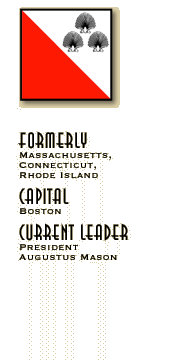
 |
||
 |
The former states of Massachusetts, Connecticut, and Rhode Island survives on cross-Atlantic and cross-American trade, financial neutrality, and strict anti-pirate patrolling. Boston serves as one of the main American clearinghouses for European imports and American exports. Although a competitor with the Empire State, the two nations find enough benefit in cooperation to avoid active rivalry. Notable among the Coalition assets is its surface and airship cargo capacity, one of the highest person-to-ship rates on the continent. Although other nations have more zeppelins or surface ships or cargo planes, no nation has more combined cargo space. The Atlantic Coalition also makes a point of running the most direct routes possible. Other nations run their zeppelins in a hub-transfer system, but the Coalition airships run direct routes to London, Paris, Madrid, Barcelona, and Rome, nonstop. It's slightly more expensive, but hours or days faster. Politically, the Atlantic Coalition is little more than a mutual-defense pact between the member states. While there is a central government (a President and a General Assembly) it is fairly weak. Since all participants in the Coalition benefit from the international traffic that passes through the region, there is little internal political struggle. Currently, the leader of the Atlantic Coalition is President Augustus Mason, a solemn and taciturn man of considerable wealth and social influence. A staunch isolationist in political matters, President Mason is content to let the rest of North America handle its own affairs. Ironically, though, the international monies that filter through the Coalition are primarily used for the maintenance of the region’s air and sea defenses. Mason is constantly walking a fine line between international cooperation (largely with Europe) and isolationism (particularly where North American nations are concerned). |
|
 |